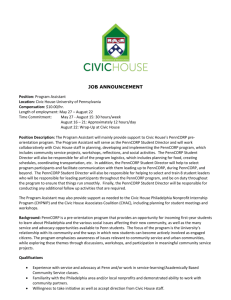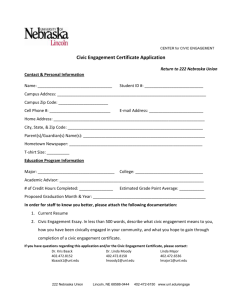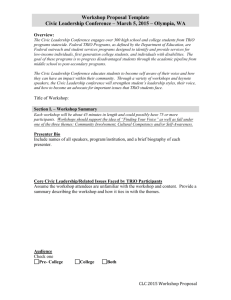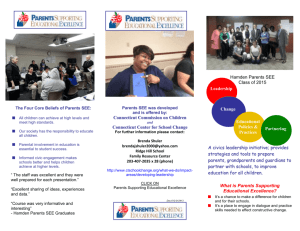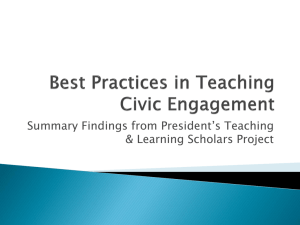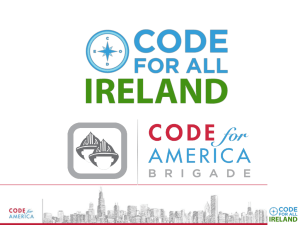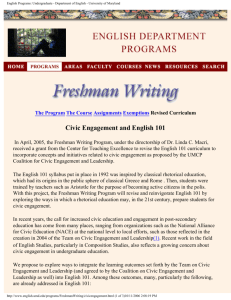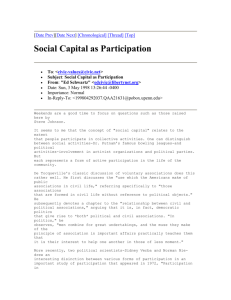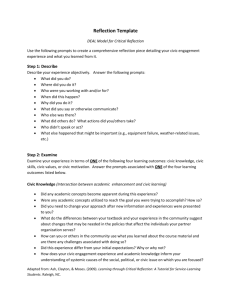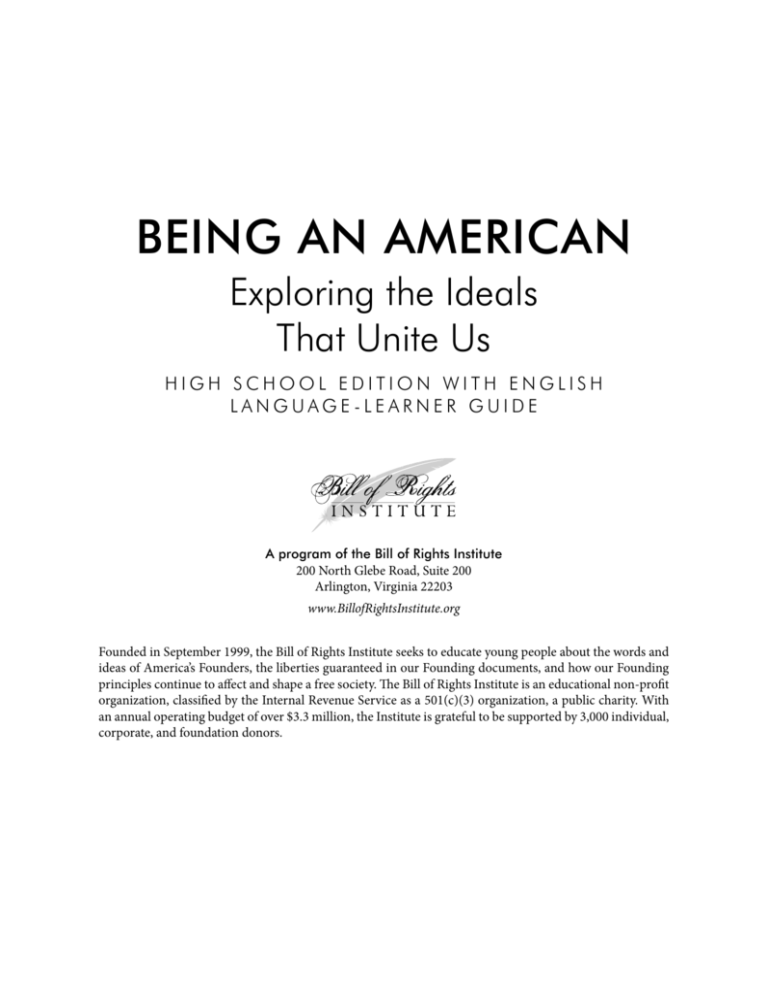
BEING AN AMERICAN
Exploring the Ideals
That Unite Us
HIGH SCHOOL EDITION WITH ENGLISH
LANGUAGE-LEARNER GUIDE
A program of the Bill of Rights Institute
200 North Glebe Road, Suite 200
Arlington, Virginia 22203
www.BillofRightsInstitute.org
Founded in September 1999, the Bill of Rights Institute seeks to educate young people about the words and
ideas of America’s Founders, the liberties guaranteed in our Founding documents, and how our Founding
principles continue to affect and shape a free society. The Bill of Rights Institute is an educational non-profit
organization, classified by the Internal Revenue Service as a 501(c)(3) organization, a public charity. With
an annual operating budget of over $3.3 million, the Institute is grateful to be supported by 3,000 individual,
corporate, and foundation donors.
Instructional Design
Veronica Burchard
Michelle Griffes
Brian Olmes
Jason Shackett
Academic Advisor
Robert M.S. McDonald, Ph.D.
United States Military Academy
Field Testing Teacher
Aubree Weeks
West Potomac High School
Alexandria, Virginia
Editors
Veronica Burchard
Michelle Griffes
Gennie Westbrook
Contributor
Susan Henson-Perry
Houston Christian High School
Houston, Texas
Production and Design
Carolyn McKinney
Perceptions Studio
© 2013, The Bill of Rights Institute
All rights reserved. Portions of this publication may be photocopied and/or reproduced within schools for
educational use only. Written permission must be secured from the publisher to use or reproduce any part
of this book outside a school.
ISBN 978-1-932785-31-9
Printed in the United States of America
TABLE OF CONTENTS
Academic and Program Advisory Councils . . . . . . . . . . . . . . . . . . . . . . . . . . . . . . . . . . . . . . . . ii
Preface. . . . . . . . . . . . . . . . . . . . . . . . . . . . . . . . . . . . . . . . . . . . . . . . . . . . . . . . . . . . . . . . . iii
Founding Principles for English Language-Learners Whose First Language is Spanish . . . . . . . . iv
Lesson One: The Declaration of Independence. . . . . . . . . . . . . . . . . . . . . . . . . . . . . . . . . . . . 1
• Analyze the document
• Understand the philosophical foundations
• Extension: Evaluate the Declaration’s influence throughout history
Lesson Two: The United States Constitution. . . . . . . . . . . . . . . . . . . . . . . . . . . . . . . . . . . . . . 27
• Understand the purpose of each Article
• Explain the powers of the branches of government
• Analyze and appreciate the ways in which the Constitution protects liberty
• Extension: Compare and contrast the Federalists and the Anti-Federalists
Lesson Three: The Bill of Rights. . . . . . . . . . . . . . . . . . . . . . . . . . . . . . . . . . . . . . . . . . . . . . . 57
• Understand and evaluate the protections
• Analyze the impact and interdependence of rights
• Understand the Supreme Court’s role relating to the Bill of Rights
• Extension: Conduct a mock Supreme Court hearing on Bill of Rights cases
Lesson Four: America’s Civic Values . . . . . . . . . . . . . . . . . . . . . . . . . . . . . . . . . . . . . . . . . . . 85
• Understand the meaning and importance of several civic values
• Evaluate scenarios where civic values can be exercised
• Extension: Analyze primary source documents about civic values
Lesson Five: American Heroes: Past and Present . . . . . . . . . . . . . . . . . . . . . . . . . . . . . . . . . 133
• Understand how civic values have motivated people throughout history
• Analyze the values, attitudes, and actions of historic individuals
• Extension: Conduct an interview of a heroic community member
Answer Key. . . . . . . . . . . . . . . . . . . . . . . . . . . . . . . . . . . . . . . . . . . . . . . . . . . . . . . . . . . .
Standards. . . . . . . . . . . . . . . . . . . . . . . . . . . . . . . . . . . . . . . . . . . . . . . . . . . . . . . . . . . . .
Image Credits. . . . . . . . . . . . . . . . . . . . . . . . . . . . . . . . . . . . . . . . . . . . . . . . . . . . . . . . . .
Character Card Resources. . . . . . . . . . . . . . . . . . . . . . . . . . . . . . . . . . . . . . . . . . . . . . . . .
199
205
206
207
i
ACADEMIC ADVISORY COUNCIL
William Damon, Ph.D.
Stanford University
Richard Epstein
University of Chicago
Law School
William Galston, Ph.D.
Brookings Institution
A. E. Dick Howard
University of Virginia
School of Law
Alex M. Johnson, Jr.
University of Minnesota
Law School
Charles R. Kesler, Ph.D.
Claremont McKenna College
Sanford V. Levinson
University of Texas
School of Law
Eugene Volokh
University of California, Los
Angeles, School of Law
Stephen Macedo, Ph.D.
Princeton University
Keith Whittington, Ph.D.
Princeton University
Pauline Maier, Ph.D.
Massachusetts Institute
of Technology
Gordon Wood, Ph.D.
Brown University
John Majewski, Ph.D.
University of California,
Santa Barbara
David Marion, Ph.D.
Hampden Sydney College
Todd Zywicki,
Bill of Rights Institute Academic
Advisor
George Mason University
School of Law
Rodney Smolla
Furman University
PROGRAM ADVISORY COUNCIL
Stephen Bullick
Mount Lebanon High School
Pittsburgh, PA
David S. Butts
Cobb County School District
Marietta, GA
Kelly Curtright
Oklahoma State Department
of Education
Bruce Damasio
National Council for the Social
Studies
Dana Devon
Benjamin Franklin Tercentenary
Jennifer Foley-Hindman
Kingsway Regional High School
Swedesboro, NJ
Dr. Steve Frank
National Constitution Center
ii
Rodger Graham
ITT Educational Services, Inc.
Phyllis Schwartz
Arizona Department of Education
Chuck Hyman
Anti-Defamation League
Sara Shoob
Fairfax County Public Schools
(retired)
Annandale, VA
Robert S. Leming
Center for Civic Education
Bruce Lesh
Franklin High School
Reisterstown, MD
Jan Miller
State Bar of Texas
Tim O’Brien
Nova Southeastern University
Law School
Elaine Reed
National Council for History
Education (retired)
Alice Reilly
Fairfax County Public Schools
Annandale, VA
Dr. Patty Smith
Midland ISD Curriculum
Supervisor (retired)
Midland, TX
Amy Trenkle
Stuart Hobson Middle School
Washington, DC
Admiral Paul Yost
James Madison Memorial
Fellowship Foundation
Regina L. Zacker
New York City Department of
Education
PREFACE
Dear Educators,
What does it mean to be an American? The Bill of Rights Institute was founded in 1999 to help young
people answer this question. These essential principles, including a commitment to liberty, the rule of law,
justice, and equality of opportunity, are enshrined in the Founding documents. They are embedded in our
civic virtues --courage, perseverance, and duty, to name a few. And they have been embodied and fought for
by American heroes from the very beginning of our history.
Whether you are introducing these essential topics or reinforcing them, we trust you will find this
curriculum to be a valuable resource in your classroom. Each of five core lessons is presented in a modular
format for maximum flexibility with warm-ups, activities, discussion questions, and wrap-ups, as well as
homework and extension options. Additional, digital resources are available at www.BillofRightsInstitute.org.
Tony Woodlief, Ph.D.
President
Bill of Rights Institute
iii




